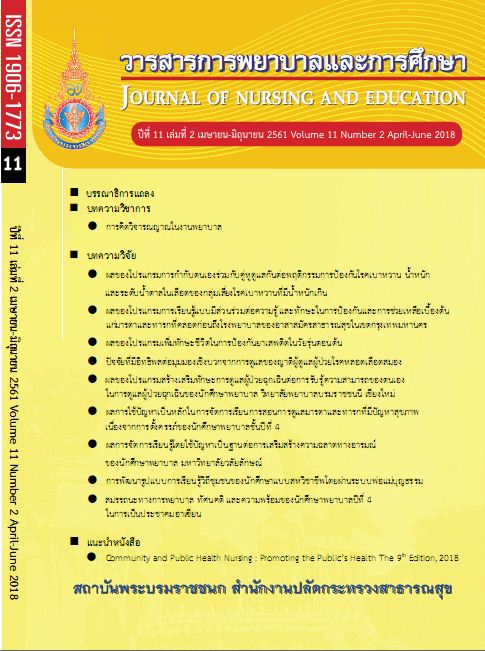Efficacy of Life Skill Improvement Program on Preventing Drug Abuse in Early Teens
ผลของโปรแกรมเพิ่มทักษะชีวิตในการป้องกันยาเสพติด ในวัยรุ่นตอนต้น
คำสำคัญ:
วัยรุ่น, การใช้สารเสพติด, ทักษะชีวิตบทคัดย่อ
บทคัดย่อ
วัยรุ่นเป็นวัยหัวเลี้ยวหัวต่อของชีวิตที่นำไปสู่การมีพฤติกรรมเสี่ยงทางสุขภาพ การใช้สารเสพติดเป็นหนึ่งในปัจจัยเสี่ยงที่ส่งผลกระทบต่อวัยรุ่น ดังนั้นจึงจำเป็นต้องพัฒนาทักษะชีวิตของวัยรุ่นในการป้องกันการใช้ยาเสพติด วัตถุประสงค์ของงานวิจัย เพื่อศึกษาประสิทธิผลของโปรแกรมการพัฒนาทักษะชีวิตในการป้องกันยาเสพติดในวัยรุ่นตอนต้น ต่อ การเห็นคุณค่าในตนเอง ทักษะการสื่อสารและความสัมพันธ์ระหว่างบุคคล และ ทักษะการตัดสินใจ การวิจัยแบบทดลองขั้นต้น (pre-experiment) แบบกลุ่มเดียวทดสอบก่อน-หลัง (one group pretest-posttest design) ใช้ในการศึกษาวัยรุ่นอายุ 12-14 ปี จำนวน 19 คน ซึ่งได้จากการเลือกแบบเฉพาะเจาะจง เพื่อเข้าร่วมโปรแกรมเพิ่มทักษะชีวิตในการป้องกันยาเสพติดเป็นเวลา 12 ชั่วโมง โดยมีการแบ่งกิจกรรมเป็น 4 ครั้ง ครั้งที่ 1 ประกอบด้วย 4 กิจกรรม ครั้งที่ 2 ประกอบด้วย 3 กิจกรรม ครั้งที่ 3 ประกอบด้วย 2 กิจกรรม และ ครั้งที่ 4 ประกอบด้วย 3 กิจกรรม เพื่อมุ่งเน้นการพัฒนาทักษะการป้องกันยาเสพติด 3 ด้าน ได้แก่ การเห็นคุณค่าในตนเอง ทักษะการสื่อสารและความสัมพันธ์ระหว่างบุคคล และ ทักษะการตัดสินใจ เก็บรวบรวมข้อมูลโดยใช้แบบสอบถามทักษะชีวิตเพื่อป้องกันการเสพยาเสพติด วิเคราะห์ข้อมูลโดยใช้สถิติเชิงพรรณนา ความถี่ ร้อยละ ค่าเฉลี่ย ส่วนเบี่ยงเบนมาตรฐาน และ Paired sample t-test
การศึกษาพบว่า การเห็นคุณค่าในตนเองเมื่อเปรียบเทียบระหว่างก่อน (Mean=3.86, SD=0.32) และหลังเข้าร่วมโปรแกรม (Mean=4.04, SD=0.47) มีคะแนนเพิ่มมากขึ้นอย่างมีนัยสำคัญทางสถิติ (t (18) = -2.36, p<.05) ทักษะการสื่อสารและความสัมพันธ์ระหว่างบุคคล อยู่ในระดับสูงทั้งก่อน (Mean=1.35, SD=0.37) และหลัง (Mean=1.45, SD=0.41) เข้าร่วมกิจกรรม ทักษะการตัดสินใจอยู่ในระดับสูงทั้งก่อน (Mean=1.59, SD=0.36) และหลัง (Mean=1.63, SD=0.27) เข้าร่วมกิจกรรม แต่ไม่พบความแตกต่างอย่างมีนัยสำคัญทางสถิติของทักษะการสื่อสารและความสัมพันธ์ระหว่างบุคคล และ ทักษะการตัดสินใจ
สรุป โปรแกรมการพัฒนาทักษะชีวิตในการป้องกันยาเสพติดในวัยรุ่นตอนต้น ช่วยพัฒนาการเห็นคุณค่าในตนเอง การพัฒนาโปรแกรมโดยการเพิ่มกิจกรรมที่เน้นการมีส่วนร่วม กิจกรรมที่มีความสนุกสนาน จะทำให้วัยรุ่นมีส่วนร่วมในโปรแกรมเพิ่มมากขึ้น และอาจมีส่วนในการช่วยพัฒนาทักษะการสื่อสารและความสัมพันธ์ระหว่างบุคคล และ ทักษะการตัดสินใจ ให้มีประสิทธิภาพมากยิ่งขึ้นต่อไป
เอกสารอ้างอิง
1. Thanyarak Institute on Drug Abuse. Number and percentage of all addicted patients in Thanyarak Institute on Drug Abuse separated by Fiscal Year 2012- 2016 [Internet]. 2016 [cited 2017 April 9]; Available from:
http://www.thanyarak.go.th/thai/index.php?option=com_content&task=view&id=2362&Itemid=61
2. National Institute on Drug Abuse. Preventing Drug Abuse: The Best Strategy [Internet]. 2014 [cited 2017 January 1]; Available from: https://www.drugabuse.gov/publications/drugs-brains-behavior-science-
addiction/preventing-drug-abuse-best-strategy
3. Meadows-oliver. Pediatric nursing made incredibly easy! 2nd ed. Wolters Kluwer; 2015.
4. National Institute on Drug Abuse. Understanding Drug Abuse and Addiction: What Science Says [Internet]. 2016 [cited 2017 April 9]; Available from:
https://www.drugabuse.gov/publications/teaching-packets/understanding-drug-abuse-addiction/section-i
5. Crowley DM, Jones DE, Coffman DL, Greenberg MT. Can We Build an Efficient Response to the Prescription Drug Abuse Epidemic? Assessing the Cost Effectiveness of Universal Prevention in the PROSPER Trial. Prev Medicine. 2014(62):71-7. doi:10.1016/j.ypmed.2014.01.029
6. Spoth R, Trudeau L, Redmond C, Shin C. Replication RCT of Early Universal Prevention Effects on Young Adult Substance Misuse. J Consul Clin Psychol, 2014(82): 949-63. doi:10.1037/a0036840.
7. World Health Organization. Skills for health; Skills-based health education including life skills: An important component of a child-friendly/health-promoting school [Internet]. n.d. [cited 2017 April 9]; Available from:
http://www.who.int/school_youth_health/media/en/sch_skills4health_03.pdf
8. Boonpleng W, Sriwongwan W, Norapoompipat A, Pisaipan P. Risk Behaviors and Behavioral Problems of Adolescent: A Case Study of School Children in Nonthaburi Municipality. Proceedings of the diversity in health and well-being conference. 25th -26th July 2015; Pitsanulok, Thailand.
9. Nakaram, N. The effectiveness of life skill development program for drug addiction prevention of secondary school students in Phra Nakhon Sri Ayutthaya province [Internet]. 2016 [cited 2017 April 19]; Available from: http://thesis.swu.ac.th/swuthesis/Hea_Ed (M.S.)/Narin_N.pdf.
10. Ojo MA, Akintoyese O, Adenibuyan P, Adegbohun AA, Abiri K. Relationship between poor self-esteem and adolescent substance use [Internet]. 2013 [cited 2017 April 6]; Available from: https://www.drugabuse.gov/international/abstracts/relationship-between-poor-Self-esteem-adolescent-substance-use
11. Panpin P. Life skill development program for preventing drug abuse in primary school students, Chiang Rai province [Internet]. 2008 [cited 2017 November 60]; Available from:http://library.cmu.ac.th/digital_collection/etheses%20/fulltext.php?id=30133&word=%E0%B8%A2%E0%B8%B2%E0%B9%80%E0%B8%AA%E0%B8%9E%E0%B8%95%E0%B8%B4%E0%B8%94&check_field=SUBJECT&select_study=&condition=2&search=9&philosophy=&master=
12. Faggiano F, Vigna-Tagliati FD, Versino E, Zambon A, Bonaccino A, Lemma P. School-based prevention for illicit drugs use: A systematic review. Preventive Medicine, 2008; 46(5): 385-96.






